Camilo Romero: "We must regain the trust of the national majority."

Former governor of Nariño and former ambassador to Argentina, Camilo Romero, spoke in an interview with EL TIEMPO about his presidential candidacy, the left's views within the Broad Front, and the path he will take. He also discussed the criticisms he has faced against President Gustavo Petro's administration and how this could affect him during the campaign.
At what point did you decide to run for president? Political unrest has been there for a long time, always standing on the side of the citizens, confronting what we have called a traditional political class that we believe has left the country and democracy with an undesirable balance sheet. Getting involved in politics has meant for me the step toward trying to transform the country, and we have already gone through several stages . I was a senator from 2010 to 2014, and I was a presidential candidate in 2014, which was when I garnered the most citizen support; 746,518 Colombians voted for me in that referendum. If I think there's one thing the country needs today, it's a model of management and governance.
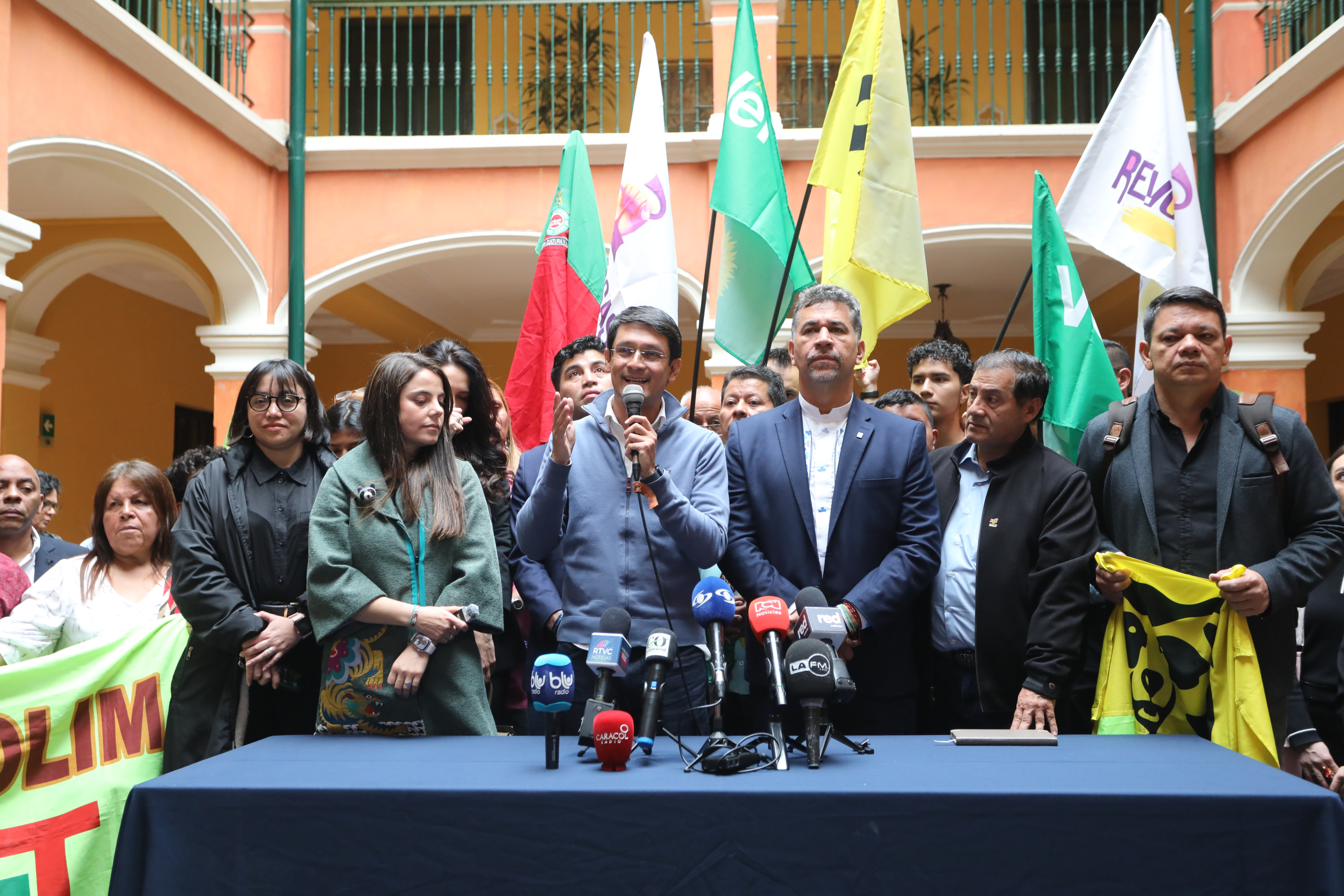
The former ambassador stated that he still doesn't know which party he will seek the endorsement from. Photo: Milton Diaz
Beware of believing we've won power. Winning an election means winning a portion of political power in Colombia, not even the presidency, not even the majorities in Congress, not even the regions, much less in other areas of the Colombian state. A portion of the population understands what's happening, is going all out, and knows there's a power struggle, that there are others who won't give in. President Petro is seeking structural changes, because we've never talked about reforms in the country. The bottom line is that for the first time, there's a government willing to try to guarantee citizens' rights and a traditional political class willing to prevent it. That's the underlying confrontation.
You say there's a power struggle. Doesn't that end up being the mistake of four years, not understanding that they came to power? A full assessment of the government's performance is necessary. You cannot say or conclude that the Petro who took office was the Petro who began the new campaign from the presidency. Petro's first gesture upon winning the presidency was to meet with Uribe. Petro's first message was to meet with his opponents. His second message was to appoint a cabinet that included seven ministers who had previously served in public and political office, who may be part of it, recognizing their value and their work, but they are part of an establishment. You see the change in discourse, yes, I recognize it. It's a change of discourse, from saying, "They deceived me." I tried to reach a national agreement, they didn't want to talk to me. What we are proposing today, at least, is focused on us being able to regain the trust of the national majority.
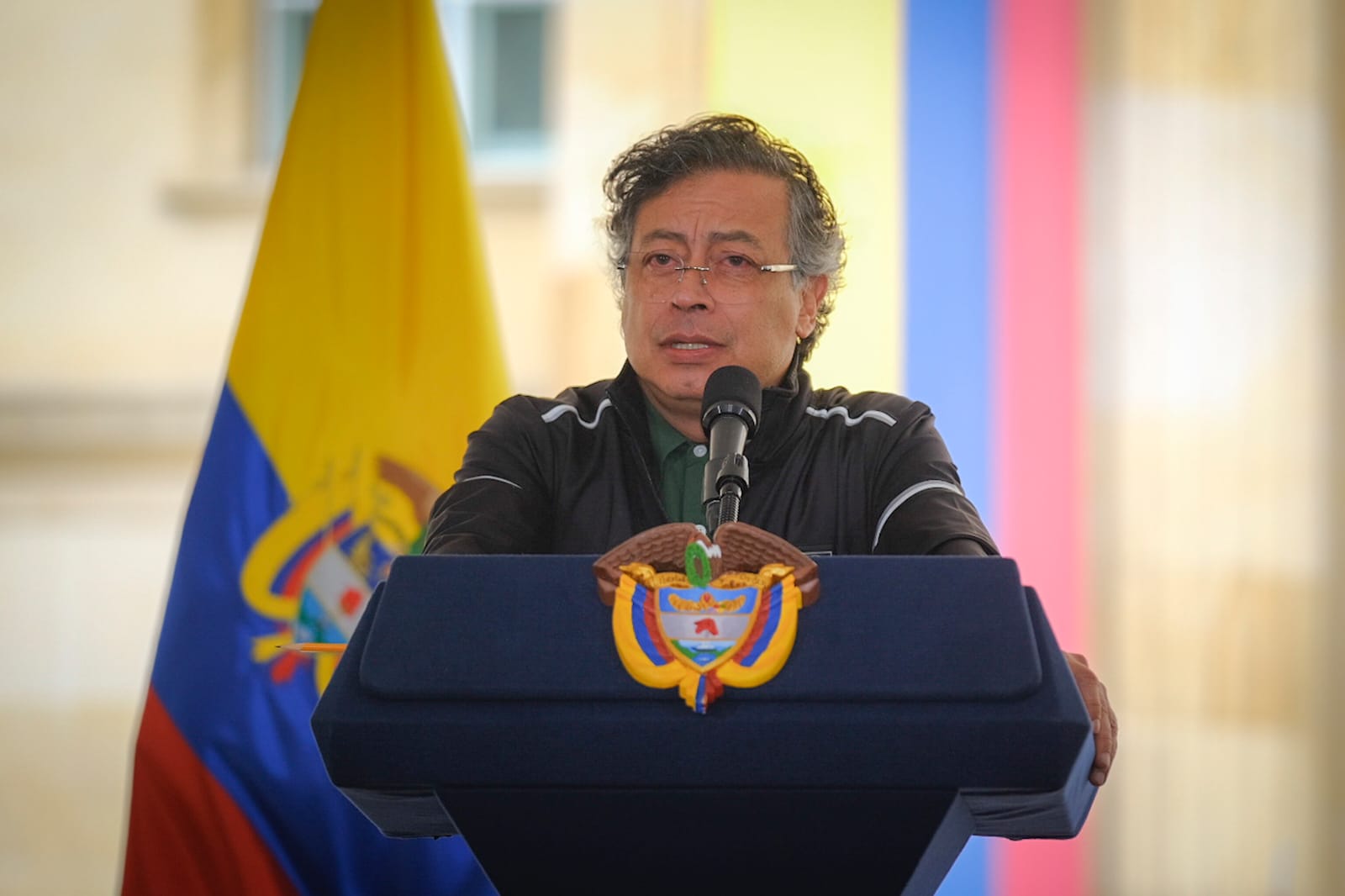
President Gustavo Petro. Photo: Presidency
We necessarily propose a model of open government and public management, which means, first, transparency. Second, participation. Third, collaboration. Fourth, government management and execution. People can see online how each ministry is executing, how programs and projects are progressing, how goals are being achieved, and who the officials are.
Do you think your closeness to the government could hurt your campaign? I'm not here to renounce the idea, as former government ministers have done, nor as former allies of the government. I had to be 7,000 kilometers away, but I have the courage to say, I'm part of the alternative sector in Colombia. I'm neither ashamed nor embarrassed to say it; it exalts me. And I can also say that I've walked side by side and we've met several times with President Gustavo Petro. We've had parallel paths, and we've met on those paths. Because, ultimately, the progressive sector is more than a personal approach; the alternative sector is more than a person. We recognize the capacity of someone who becomes president of the Republic from a sector that until then was marginal in public and political action in Colombia.
What have you discussed with President Petro? The conversation I had with him took place on March 2nd in Montevideo. And it was nothing different from what is publicly known. He has said, I think we need to convene a broad front, and personally, he told me, there lies the broad front. So, we are called to build a broad front. I think it's necessary for the country and it goes beyond the progressive sector, the left, and the center-left sectors. It is ultimately the meeting point of the national majorities, and it is where I believe we should stand.
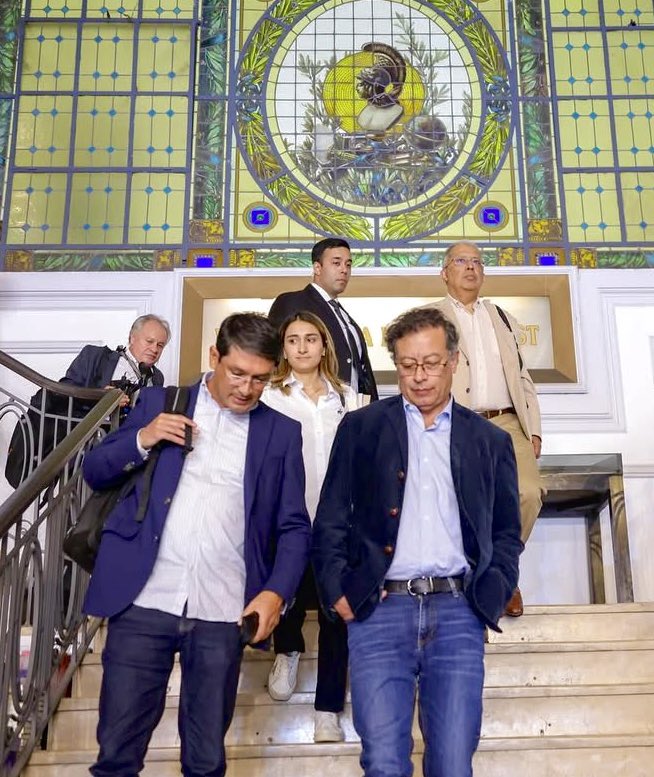
Camilo Romero with President Gustavo Petro in Uruguay. Photo: Social media
Four years ago, I tried to be the candidate for the Green Alliance party. In the end, it didn't happen, and it didn't happen because certain democratic conditions weren't met, but that has left a great learning experience, which is also an example for the man who is now President of the Republic. Political ideas and initiatives are above any structure, political, economic, or partisan. It's a reality. Today, we have friends in the Green Alliance party, friends in the Green Alliance party, without a doubt. There's an alternative, progressive sector that supports us. They haven't set the rules of the game. In fact, Senator Inti Asprilla is inviting me again to join the Green Party, but until there are clear rules of the game, what we're going to do is start, tour the country, listen to everyone, strengthen this idea of a broad front, and then we'll focus on the electoral mechanics.
You said at the campaign launch that you've received several proposals. Who have you received them from? More than proposals, we are in dialogue. Last Monday, I had a meeting with the Historic Pact. The contribution we can make is more than coming to compete; we are here to cooperate. We are here to help, to put our shoulders to the wheel and get moving, as they say, "forward. " We spoke with our friends from the Historic Pact, with whom we have journeyed together, walked together. If it's just a referendum that any of those present win, in my opinion, we urgently need to build a coherent, consistent candidacy capable of dialogue and convening with the majorities of Colombia. I spoke that day with another alternative sector that calls itself Unitarians and I was talking with them. And, of course, I'm going to propose a conversation with sectors of the Green Alliance party. So, we will define the political mechanics in due time.
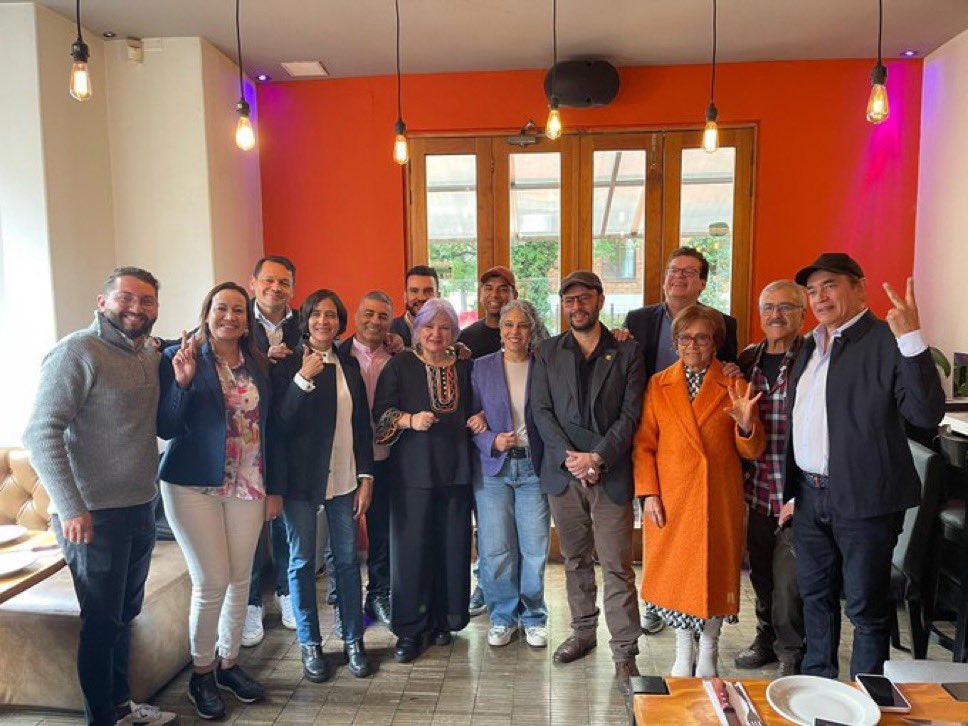
Political leaders of the Historic Pact Photo: Historic Pact
I want to go out even more to the regions and territories. In what I'm working on, the next consistent step would be March, but I don't rule out October. Because many sectors, many people who are friends of the Pact, are inviting us all over the country to talk.
Gustavo Bolívar leads in the polls, but there's also the possibility that President Gustavo Petro doesn't want him because he says he'd lose the election. How do you see this? Bolívar is a valuable figure in Colombian politics because he's an extraordinary politician. He's a man who has earned a place in the country, and beyond his approval or disapproval ratings, he has credibility. He's an honest figure in Colombian politics, who speaks his mind. I think that's valuable, and we must recognize him in the political arena. I'm sure he'll play a leading role in public affairs. One can't rule out a man like Bolívar, but he, we, and everyone else must also be prepared for a strategy of victory.
You were mentioned in the UNGRD corruption scandal. Chats emerged in which you recommended people like Pedro Rodríguez, and he included you in his collaboration matrix. Do you think this will be an issue that could cost you in your campaign? What happened with the National Unit for Risk Management goes beyond even ideological issues. Ultimately, they're issues of human nature. Since I know Olmedo, Petro appoints Olmedo, Olmedo seeks me out. Since I'm sure, I seek out others. And he's the one who asks me for my resumes. Which is very different. What do I do? The guy asks me for some resumes, and I send seven. From people I consider, up until that point, they had no blemishes.
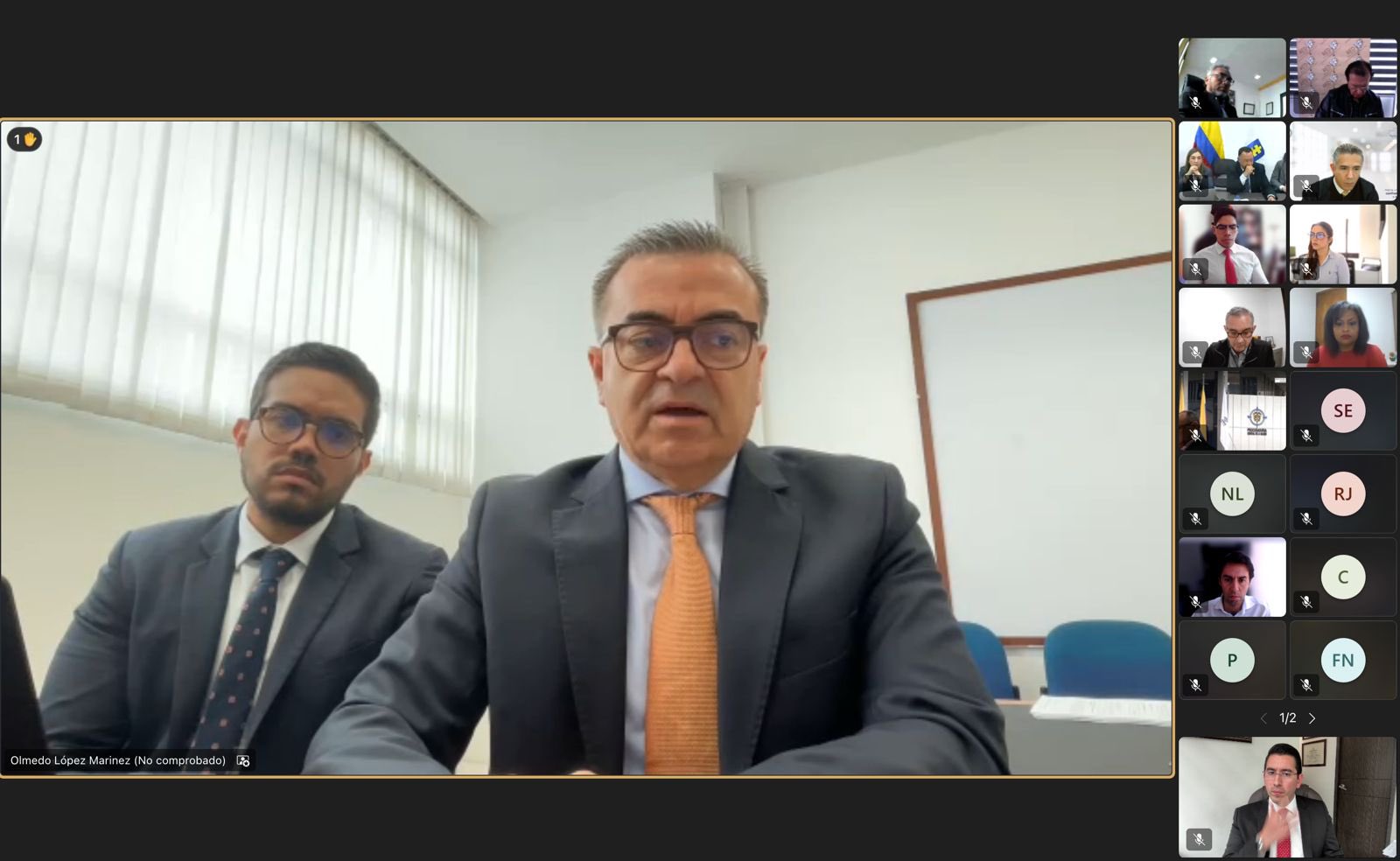
Olmedo López at a hearing on the UNGRD corruption scandal. Photo: Private Archive
I have the ability to tell the country what I've told you, which is exactly what happened. That's what happened there. The Colombian people have the certainty that I'm not involved in politics to enrich them, that I'm not involved in that, nor in any corruption case in my country. Of course, these things, I insist, must become increasingly less acceptable to Colombian society; they must be rejected by Colombian society. And that's why I propose a management and government model for Colombia.
In addition to the scandals that have rocked this government, there has also been criticism that some traditional political figures who weren't supposed to be in this government have returned. What do you plan to propose? With the open government management model and the ability to gain society's trust through conversation, through dialogue, I think it's very important. We have to promote what we've always promoted: a different policy, an alternative policy, a policy of change. I believe that if we achieve the open government management model that Colombian society advocates, when those circumstantial figures who were with Uribe, Santos, and Petro arrive, we can propose a government that operates as a coalition, based on transparency and accountability for its actions.
Do you think people like Benedetti are necessary? Because some have said, we're left with the sin, but without the reforms. 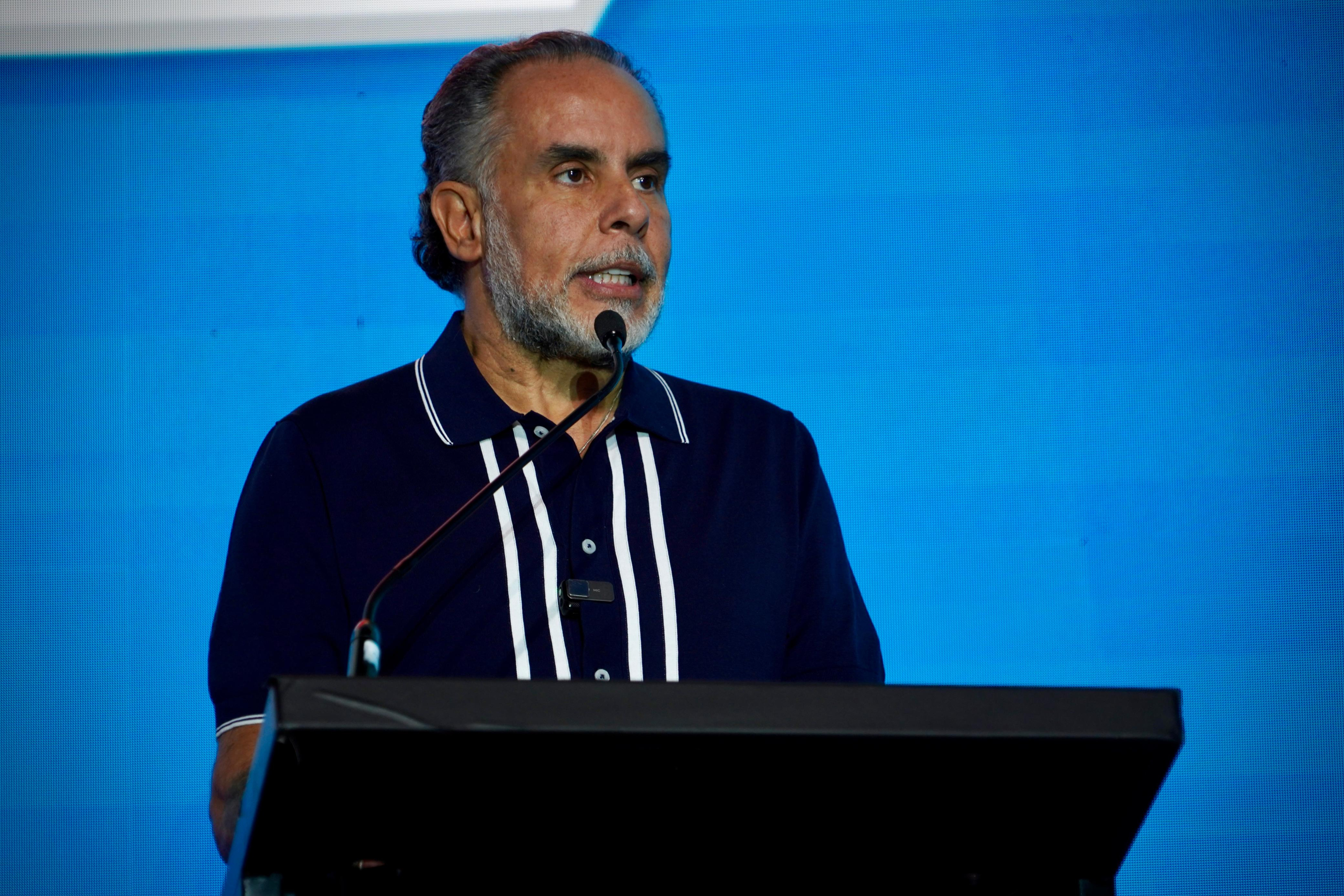
Interior Minister Armando Benedetti. Photo: Sergio Cárdenas | El Tiempo
These are decisions the president has already made, which have become reality. I believe the framework we can propose is the one I've told you about: a framework of pursuing this policy of dialogue with many sectors, but under the umbrella of open government, which I believe is what the country needs today. I feel the country needs a guarantee today, and we believe we are the ones who can provide the answer to that.
We're at a time when the relationship between the executive and legislative branches isn't the best. If you become president, what would you do? Without a doubt, it has been proven that change is not only preached and practiced by winning the presidency of the Republic. It's a powerful lesson. If we have to do anything clearly now, it's to go for those majorities in the Congress of the Republic. I hardly believe anyone can argue that the president lacks the political will to guarantee citizens' rights. Hardly. It's proven. What happened to us? That they blocked us in Congress. What do we need? A new Congress. And that new Congress must be involved in the parallel construction of the broad front. I hope we are capable of achieving majorities in the Congress of the Republic from that broad front.
It's clear that without these majorities, the president's agenda has become more complicated, but there are issues that end up seeming to be ignoring that legitimacy. The most important example is declaring the referendum by decree. How do you view this issue? It seems to me there's a lot of discussion about form and form. Because so much criticism heard today regarding this position wasn't as forceful regarding the way that vote was held in Congress. Given these technological tools, a vote with a piece of paper in the Congress of the Republic is, to say the least, shameful. It doesn't make sense. In other words, it doesn't elevate democracy. The strongest argument in all this is that the president's goal is for the people and the citizens to express themselves at the ballot box. No dictatorship does that. What a dictatorship does is prevent that.
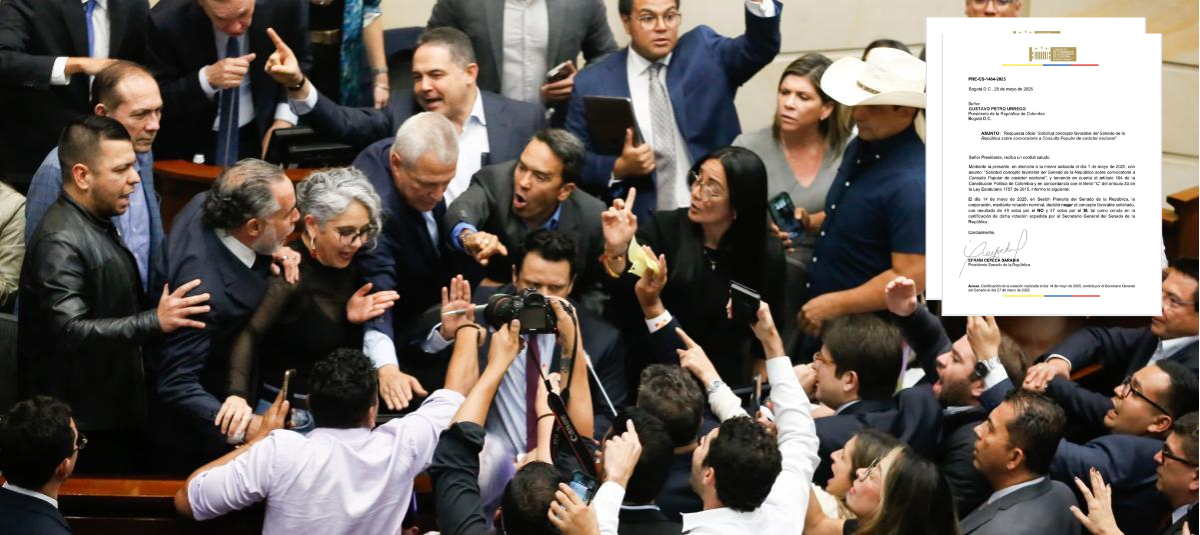
On May 14, the Senate plenary session defeated the referendum. Photo: Néstor Gómez / El Tiempo - Personal Archive
The judicial branch will rule. The Constitutional Court will have to rule. No one will deny that. It's not that a decision by Congress is being denied; it's a matter of whether it was a good decision or not. That's why I tell you that we're already working on the details.
President Gustavo Petro bet on professionalizing diplomats during his campaign, but cases like yours demonstrate that this wasn't the case. Would you follow that same line? Political appointments are a reality in governments. It's not just that this administration implemented them. Governments have had that. There has been an effort to improve the quality of appointments by ensuring that they are career officials who, of course, have merit, who have done a job, who deserve those positions. But I believe a combination of these two things cannot be denied for proper functioning because, ultimately, we represent the State but also the Government.
Who would you govern with? I believe there have already been successful alternative government exercises in Colombia at the municipal and departmental levels. That has happened. There are several examples of successful people in government exercises. I believe we need to recover that. In Colombia, we tend to start over. At least there are government exercises every four years, as if nothing else is useful. Some are completely bad, others are only good. There must be a guarantee of an exercise, in my view, that builds trust and transparency in Colombian society. The doors must be opened to a meritocracy that, within this style of open government, is not only permitted, but also promoted, endorsed, and supported, but understanding, without a doubt, a framework for action that has to do with a government program in elections and a national development plan in the exercise of government.
Maria Alejandra Gonzalez and Juan Sebastian Lombo
eltiempo




